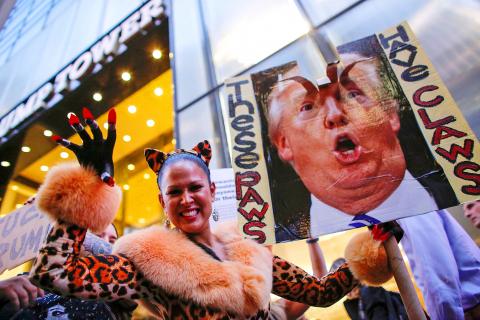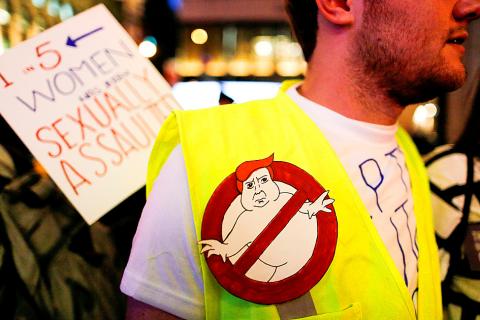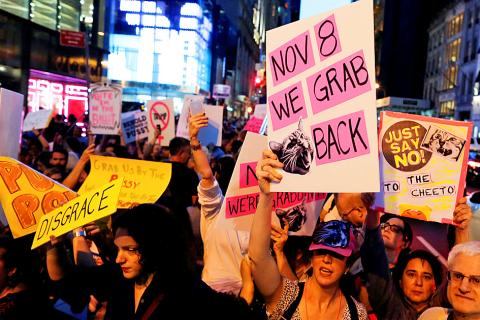Donald Trump’s self-inflicted wounds threaten not only his White House chances, but his business empire’s core asset: his name.
Emblazoned on luxury residential towers or sprawled over casinos and used to market steaks, shirts and ties, the Trump brand has long been a central selling point for the US Republican presidential nominee, helping him amass a personal fortune estimated at several US billion dollars and seemingly unlimited media attention.
However, the former reality TV star has a new line of work: Having long portrayed his life as a smash success, he has run a divisive election campaign that could drive off customers.

Photo: AFP
It has already cost him at least one business associate, who was repelled by Trump’s remarks on women, veterans, Mexicans and others.
A rival rich man said Trump is toast.
“This is the beginning of the end for Donald Trump, not only for his run for the presidency, but his brand, his properties, his businesses,” billionaire media mogul Mark Cuban, a supporter of US Democratic presidential candidate Hillary Rodham Clinton, said in a TV appearance this month. “He’s been scorched.”

Photo: Reuters
However, the Trump Organization told reporters its brand is doing better than ever.
“The Trump brand remains incredibly strong and we are seeing tremendous success across business units,” a spokesperson said in an e-mail. “We continue to outperform our competitors and are very enthusiastic about the future and our continued growth.”
As the company is not publicly traded, it is difficult to tell precisely if it has lost the confidence of investors and consumers, but there are worrying signs.

Photo: Reuters
Greeted by protests at its opening in Washington, the new Trump International Hotel Washington, DC had difficulty fully booking its rooms and had to offer discounts, according to media reports.
Prior to the opening, noted Washington-based Spanish restaurateur Jose Andres pulled out of the project, which a company representative also dismissed.
“With 10 years of experience with Trump Hotels, I can easily say the opening of Trump International Hotel, Washington, DC has been the most successful in terms of opening bookings,” Mickael Damelincourt, the hotel’s managing director, said in an e-mail.
The discomfort is not confined to Washington. According to a Forbes poll in April, of 500 comparatively wealthy individuals interviewed, about half said they would avoid Trump hotels and golf courses in the coming years.
Trump-branded luxury apartments, another linchpin of his business operations, are selling below market rates, even though they had been priced 7 percent above comparable assets a year ago, according to a study by US real-estate brokerage Redfin.
“The Trump brand was really associated with luxury and a cachet that were enough to justify a sizable premium on the market, but this positive association has disappeared,” Redfin chief economist Nella Richardson said.
Aspects of Trump’s White House campaign could turn off foreign buyers or reduce the prices they are willing to pay, she said.
His repeated attacks on China could discourage wealthy Chinese clients in particular, who make up a large part of the market for his luxury residences.
And his popularity among a segment of the electorate will not be able to make up the shortfall, as not enough of them are likely to be buyers of luxury real estate.
To be sure, there are brands in the US that have been able to recover after suffering grave crises tied to environmental disasters or political controversies, said Merry Carole Powers, a writer and expert on brands and marketing.
However, Trump’s case is unprecedented.
“Usually when a brand gets caught in a bad public relations operation it was an accident. They didn’t mean for that to happen,” she said.
However, Trump is “blatantly saying: ‘I don’t care what you think,’” Powers told reporters. “We’ve never seen a brand behave like this.”

Vincent Wei led fellow Singaporean farmers around an empty Malaysian plot, laying out plans for a greenhouse and rows of leafy vegetables. What he pitched was not just space for crops, but a lifeline for growers struggling to make ends meet in a city-state with high prices and little vacant land. The future agriculture hub is part of a joint special economic zone launched last year by the two neighbors, expected to cost US$123 million and produce 10,000 tonnes of fresh produce annually. It is attracting Singaporean farmers with promises of cheaper land, labor and energy just over the border.

US actor Matthew McConaughey has filed recordings of his image and voice with US patent authorities to protect them from unauthorized usage by artificial intelligence (AI) platforms, a representative said earlier this week. Several video clips and audio recordings were registered by the commercial arm of the Just Keep Livin’ Foundation, a non-profit created by the Oscar-winning actor and his wife, Camila, according to the US Patent and Trademark Office database. Many artists are increasingly concerned about the uncontrolled use of their image via generative AI since the rollout of ChatGPT and other AI-powered tools. Several US states have adopted

A proposed billionaires’ tax in California has ignited a political uproar in Silicon Valley, with tech titans threatening to leave the state while California Governor Gavin Newsom of the Democratic Party maneuvers to defeat a levy that he fears would lead to an exodus of wealth. A technology mecca, California has more billionaires than any other US state — a few hundred, by some estimates. About half its personal income tax revenue, a financial backbone in the nearly US$350 billion budget, comes from the top 1 percent of earners. A large healthcare union is attempting to place a proposal before

KEEPING UP: The acquisition of a cleanroom in Taiwan would enable Micron to increase production in a market where demand continues to outpace supply, a Micron official said Micron Technology Inc has signed a letter of intent to buy a fabrication site in Taiwan from Powerchip Semiconductor Manufacturing Corp (力積電) for US$1.8 billion to expand its production of memory chips. Micron would take control of the P5 site in Miaoli County’s Tongluo Township (銅鑼) and plans to ramp up DRAM production in phases after the transaction closes in the second quarter, the company said in a statement on Saturday. The acquisition includes an existing 12 inch fab cleanroom of 27,871m2 and would further position Micron to address growing global demand for memory solutions, the company said. Micron expects the transaction to